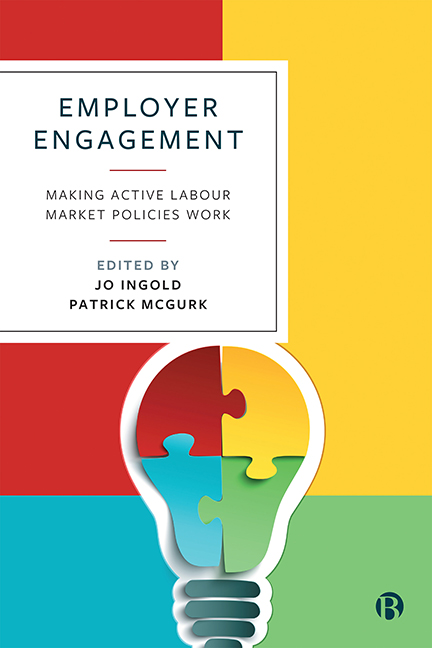Book contents
- Frontmatter
- Contents
- List of Figures and Tables
- List of Abbreviations
- Notes on Contributors
- Acknowledgements
- 1 Introduction: Why Is Employer Engagement Important?
- Part I The Macro Level: Political Economy and Policies
- Part II The Meso Level: Programmes and Actors
- Part III The Micro Level: Workplaces and Their Contexts
- Index
12 - Conditions, Processes and Pressures Promoting Inclusive Organizations
Published online by Cambridge University Press: 18 January 2024
- Frontmatter
- Contents
- List of Figures and Tables
- List of Abbreviations
- Notes on Contributors
- Acknowledgements
- 1 Introduction: Why Is Employer Engagement Important?
- Part I The Macro Level: Political Economy and Policies
- Part II The Meso Level: Programmes and Actors
- Part III The Micro Level: Workplaces and Their Contexts
- Index
Summary
This chapter examines the environmental conditions, pressures and processes that promote an inclusive, adaptive organization. An adaptive organization is necessary for recruiting and retaining marginalized groups in the labour market. We begin with theoretical concepts in well-established leadership theory, and transition to real-world examples. Based on years of research findings from multiple cases involving large corporations, we lay out important strategies for organizations to successfully integrate large numbers of disabled members into the workforce. Specifically, we draw from three studies involving global industries: 1) three distribution centres for Walgreens, a retail and wholesale pharmaceutical corporation; 2) three distribution centres for Sephora, a cosmetics corporation; and 3) a manufacturing plant in North America, part of a multinational automotive supplier. All three global corporations have undergone recent, radical change improving inclusivity. The first two of the example corporations have each developed three distribution centres – where in a single 500-employee distribution centre, there are between 100 and 200 employees with disabilities. In the third example, the multinational automotive supplier changed the culture in a large manufacturing plant containing over 800 employees generating $US1 billion in sales (Moore and Hanson, 2022). In all three corporations, production, retention, and job satisfaction increased from previous conditions, with absenteeism and turnover rates declining, while productivity increased.
Internal and external pressures can create the need for organizations to adapt to new conditions. Some pressures are helpful, while others stymie organizational purpose. Furthermore, pressures can be created within the organization to promote changes that make a better fit with the environment, leading to outcomes such as innovation, increased productivity, and faster solutions to company challenges. In part, leaders are able to shape a unit’s pressures and conditions for building a successful, inclusive organization.
In this chapter we begin by discussing the importance of moving away from traditional styles of leadership, and adopting a more comprehensive model that better supports inclusive organizations. We introduce elements of complexity leadership theory, which we argue provides a stronger framework for adaptability – the creation of an inclusive organization. After a short introduction, we integrate case study examples while discussing the importance of organizational conditions, pressures, and processes – all critical elements in creating a successful, inclusive organization.
- Type
- Chapter
- Information
- Employer EngagementMaking Active Labour Market Policies Work, pp. 201 - 216Publisher: Bristol University PressPrint publication year: 2023



